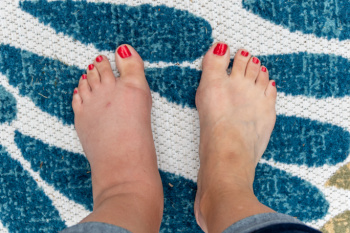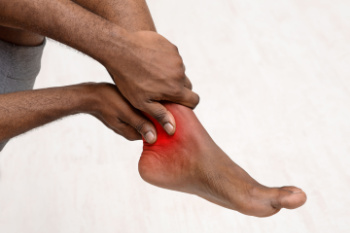 Swollen feet can be caused by various things, ranging from simple overuse to more complex health issues. While occasional swelling might not be a cause for immediate concern, especially if swelling goes down with rest and elevation, there are other times when it is important to make an appointment with a foot doctor. If the swelling is persistent, has associated pain, or only affects one foot, it may show underlying problems such as infections, injuries, or vascular disorders that require professional evaluation and treatment. Additionally, if you have pre-existing health conditions like diabetes, heart disease, or kidney problems, swollen feet could indicate complications related to these conditions. Experiencing additional symptoms such as redness, warmth, or changes in skin color around the swollen area also warrants a visit to a foot doctor. Foot doctors, also known as podiatrists, can diagnose the root cause of swollen feet and offer targeted treatment to alleviate the discomfort and any potential health risks. It is suggested that you make an appointment with a podiatrist promptly if you are experiencing persistent swollen feet.
Swollen feet can be caused by various things, ranging from simple overuse to more complex health issues. While occasional swelling might not be a cause for immediate concern, especially if swelling goes down with rest and elevation, there are other times when it is important to make an appointment with a foot doctor. If the swelling is persistent, has associated pain, or only affects one foot, it may show underlying problems such as infections, injuries, or vascular disorders that require professional evaluation and treatment. Additionally, if you have pre-existing health conditions like diabetes, heart disease, or kidney problems, swollen feet could indicate complications related to these conditions. Experiencing additional symptoms such as redness, warmth, or changes in skin color around the swollen area also warrants a visit to a foot doctor. Foot doctors, also known as podiatrists, can diagnose the root cause of swollen feet and offer targeted treatment to alleviate the discomfort and any potential health risks. It is suggested that you make an appointment with a podiatrist promptly if you are experiencing persistent swollen feet.
Swollen feet can be a sign of an underlying condition. If you have any concerns, contact Brian Shwer, DPM of Southaven Foot Clinic. Our doctor can provide the care you need to keep you pain-free and on your feet.
Swollen feet are a common ailment among pregnant women and people who stand or sit for extended periods. Aging may increase the possibility of swollen feet and patients who are obese often notice when their feet are swelling too. There may be medical reasons why swollen feet occur:
Swollen feet can also be caused by bone and tendon conditions, including fractures, arthritis, and tendinitis. Additionally, there may be skin and toenail conditions and an infection may cause the feet to swell. Patients who take medicine to treat high blood pressure may be prone to getting swollen feet.
Many patients elevate their feet to help relieve the swelling and this is generally a temporary remedy. When a podiatrist is consulted the reason behind the swelling can be uncovered and subsequently treated.
If you have any questions please feel free to contact our office located in Southaven, MS . We offer the newest diagnostic tools and technology to treat your foot and ankle needs.

Psoriatic arthritis, or PsA, is a condition intricately linked with psoriasis, affecting up to 50 percent of those individuals with PsA. Psoriatic arthritis targets the joints, tendons, and ligaments of the feet, leading to inflammation and discomfort. Symptoms can include swelling, pain, stiffness, and changes in appearance, such as nail pitting and skin lesions. Foot involvement in PsA can make walking and daily activities challenging, with conditions like plantar fasciitis and Achilles tendonitis causing significant pain and limiting movement. Complications like dactylitis, which is a sausage-like swelling of the toes, and arthritis mutilans, or joint deformity, can occur if left untreated. Podiatrists can offer tailored treatment plans, including medication and specific orthotics to alleviate symptoms and enhance mobility. If you believe you have psoriatic arthritis that is affecting your feet, it is suggested that you schedule an appointment with a podiatrist.
Arthritis can be a difficult condition to live with. If you are seeking treatment, contact Brian Shwer, DPM from Southaven Foot Clinic. Our doctor can provide the care you need to keep you pain-free and on your feet.
Arthritic Foot Care
Arthritis is a term that is commonly used to describe joint pain. The condition itself can occur to anyone of any age, race, or gender, and there are over 100 types of it. Nevertheless, arthritis is more commonly found in women compared to men, and it is also more prevalent in those who are overweight. The causes of arthritis vary depending on which type of arthritis you have. Osteoarthritis for example, is often caused by injury, while rheumatoid arthritis is caused by a misdirected immune system.
Symptoms
Arthritic symptoms range in severity, and they may come and go. Some symptoms stay the same for several years but could potentially get worse with time. Severe cases of arthritis can prevent its sufferers from performing daily activities and make walking difficult.
Risk Factors
If you suspect your arthritis is affecting your feet, it is crucial that you see a podiatrist immediately. Your doctor will be able to address your specific case and help you decide which treatment method is best for you.
If you have any questions, please feel free to contact our office located in Southaven, MS . We offer the newest diagnostic and treatment technologies for all your foot care needs.

To maintain optimal foot health, men should incorporate care routines into their daily regimen. These practices are important for preventing common issues such as rough skin and nail problems. Regular moisturizing helps combat dryness and prevents calluses. Cleaning between the toes is important for preventing bacterial growth and conditions like athlete's foot. Proper footwear selection is also important, and this involves making sure shoes fit well and have soft padding to minimize friction and callus formation. Additionally, trimming toenails straight across and exfoliating feet regularly with a body scrub can help maintain overall foot health. Wearing sandals or shoes in communal areas like gyms and public showers is important to prevent fungal infections. Finally, incorporating body powder into the routine can aid in absorbing excess moisture and alleviating discomfort, particularly for those who lead active lifestyles. If you have persistent pain, skin issues, or an infection on your feet, it is suggested that you make an appointment with a podiatrist for an examination and any treatment deemed necessary.
Everyday foot care is very important to prevent infection and other foot ailments. If you need your feet checked, contact Brian Shwer, DPM from Southaven Foot Clinic. Our doctor can provide the care you need to keep you pain-free and on your feet.
Everyday Foot Care
Often, people take care of their bodies, face and hair more so than they do for their feet. But the feet are a very important aspect of our bodies, and one that we should pay more attention to. Without our feet, we would not be able to perform most daily tasks.
It is best to check your feet regularly to make sure there are no new bruises or cuts that you may not have noticed before. For dry feet, moisturizer can easily be a remedy and can be applied as often as necessary to the affected areas. Wearing shoes that fit well can also help you maintain good foot health, as well as making it easier to walk and do daily activities without the stress or pain of ill-fitting shoes, high heels, or even flip flops. Wearing clean socks with closed shoes is important to ensure that sweat and bacteria do not accumulate within the shoe. Clean socks help to prevent Athlete’s foot, fungi problems, bad odors, and can absorb sweat.
If you have any questions please feel free to contact our office located in Southaven, MS . We offer the newest diagnostic and treatment technologies for all your foot and ankle needs.

Pain at the back of a dancer’s ankle can happen for various reasons, ranging from overuse to specific injuries. Achilles tendonitis, a common condition among dancers, results from repetitive stress on the Achilles tendon, leading to inflammation and discomfort. Another possible cause is posterior impingement syndrome, often seen in dancers who frequently point their toes, causing compression and irritation at the back of the ankle joint. Additionally, Haglund's deformity, characterized by a bony prominence at the back of the heel, can exacerbate discomfort, especially when wearing tight-fitting shoes. If you are a dancer and are experiencing ankle pain, it is suggested that you schedule an appointment with a podiatrist for an accurate diagnosis and effective treatment.
Ankle pain can have many different causes and the pain may potentially be serious. If you have ankle pain, consult with Brian Shwer, DPM from Southaven Foot Clinic. Our doctor will assess your condition and provide you with quality foot and ankle treatment.
Ankle pain is any condition that causes pain in the ankle. Due to the fact that the ankle consists of tendons, muscles, bones, and ligaments, ankle pain can come from a number of different conditions.
Causes
The most common causes of ankle pain include:
Symptoms
Symptoms of ankle injury vary based upon the condition. Pain may include general pain and discomfort, swelling, aching, redness, bruising, burning or stabbing sensations, and/or loss of sensation.
Diagnosis
Due to the wide variety of potential causes of ankle pain, podiatrists will utilize a number of different methods to properly diagnose ankle pain. This can include asking for personal and family medical histories and of any recent injuries. Further diagnosis may include sensation tests, a physical examination, and potentially x-rays or other imaging tests.
Treatment
Just as the range of causes varies widely, so do treatments. Some more common treatments are rest, ice packs, keeping pressure off the foot, orthotics and braces, medication for inflammation and pain, and surgery.
If you have any questions, please feel free to contact our office located in Southaven, MS . We offer the newest diagnostic and treatment technologies for all your foot care needs.